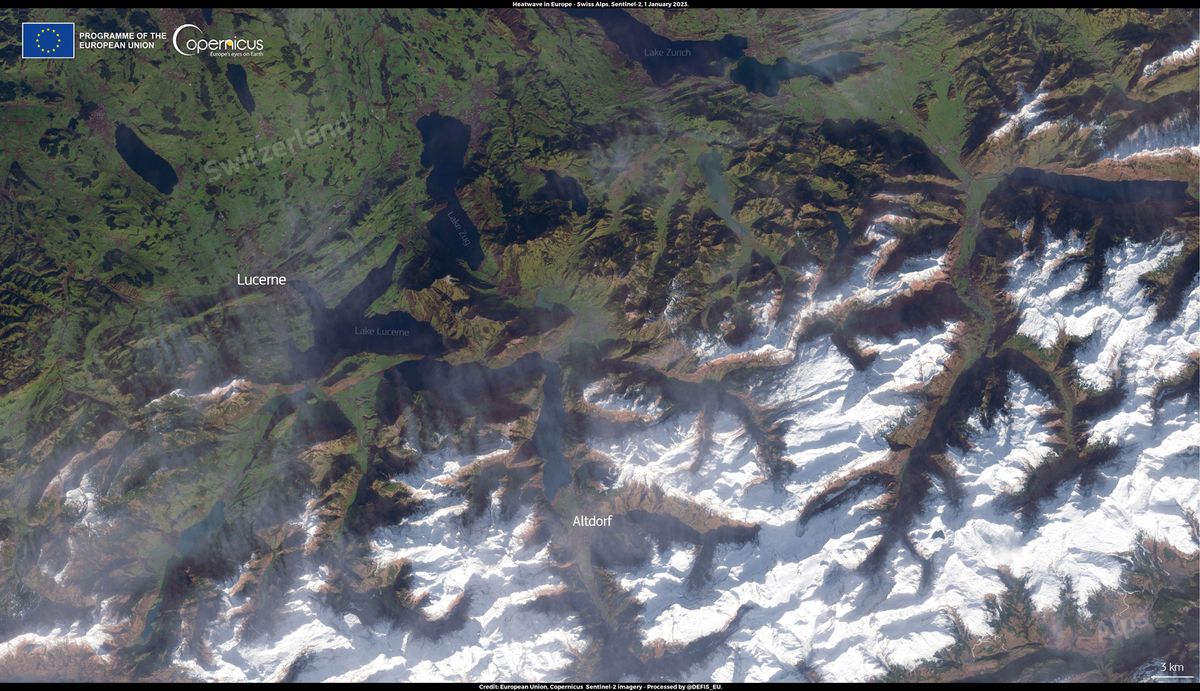Europe entered 2023 with what meteorologists described as probably the most intense winter heatwave in historical past.
Overlook about ice-covered lakes and landscapes blanketed in snow. New 12 months’s Day 2023 in lots of central European international locations was about T-shirt climate with temperature data falling like bowling pins all around the continent.
And whereas many could have loved the sudden respite from freezing chilly, climate change specialists have sounded alarm bells.
Associated: 10 devastating signs of climate change satellites can see from space
In a picture taken on Jan. 1, Europe’s Sentinel-2 satellite captured the city of Altdorf within the Swiss Alps the place temperatures on this a part of the yr often common between 28 and 39 levels Fahrenheit (minus 2 and plus 4 levels Celsius). The New 12 months’s Day of 2023, nevertheless, noticed daytime temperatures soar to 67 levels F (19.2 levels C) with even the evening remaining at a balmy 60 levels F (16 levels C). Related extremes had been recorded in lots of different international locations throughout central and northwestern Europe together with Denmark, the Netherlands, Poland and the Czech Republic.
Local weather scientists and meteorologists from all around the world flocked to Twitter to precise their astonishment on the unseasonal heatwave.
“I’ve by no means seen a forecast like this. Ever,” NASA local weather scientist Ryan Stauffer tweeted (opens in new tab) with a purple-colored picture visualizing the “temperature anomaly” throughout Europe. “The local weather implications are onerous to disregard,” he added additional down the thread.
I’ve by no means seen a forecast like this. Ever. pic.twitter.com/j2aFjayiGADecember 30, 2022
Physicist Nahel Belgherze who works on the European Synchrotron analysis facility within the French Alps shared an animation displaying a map of Europe with dozens of colourful dots bobbing up throughout representing temperature data damaged throughout the continent between Dec. 30 and Jan. 1.
“Probably the most extreme winter heatwaves in Europe’s trendy historical past visualized during the last 2 days,” Belgherze said in the tweet (opens in new tab). “A whole bunch of month-to-month heat temperature data had been damaged all around the continent. That is precisely the form of very irregular occasion that’s progressively rewriting world climatology.”
Probably the most extreme winter heatwave in Europe’s trendy historical past visualized during the last 2 days. A whole bunch of month-to-month heat temperature data had been damaged all around the continent. That is precisely the form of very irregular occasion that’s progressively rewriting world climatology. pic.twitter.com/Nb8ImytqYCJanuary 1, 2023
For locations like Altdorf, such occasions have specific significance. The city, one in every of many in Switzerland in addition to in different international locations that share chunks of Europe’s biggest mountain vary, is nestled between snow-capped mountains over 9,800 toes tall (3,000 meters). The Sentinel-2 picture reveals largely inexperienced, grass-covered panorama with snow masking solely the higher-altitude areas, a view disturbing to local weather specialists who had beforehand noticed regarding record-breaking glacier loss attributable to the recent summer season of 2022.
In line with The Conversation (opens in new tab), 6.2% of the mountain glacier mass within the Swiss Alps melted away that summer season. Now the winter season, which often gives these ice sheets with an annual enhance and respite, is witnessing their destruction too. Beforehand, scientists would take into account a 2% annual ice loss as extreme.
According to Reuters (opens in new tab), the Alps are warming by 0.5 diploma F (0.3 diploma C) per decade, which is about twice as quick as the worldwide common. Eventualities based mostly on present greenhouse fuel emissions projections foresee that as much as 80% of the Alpine glaciers could disappear by the tip of this century.
Comply with Tereza Pultarova on Twitter @TerezaPultarova. Comply with us on Twitter @Spacedotcom and on Facebook.




